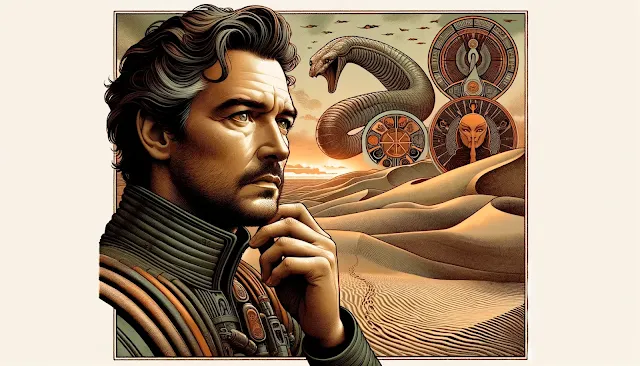The Trap of Prophecy
Villain, Hero, or Victim? Deconstructing Paul Atreides in Dune Messiah
The question of whether Paul Atreides, the central figure of Frank Herbert's Dune and Dune Messiah, transforms into a villain invites a nuanced exploration of his character, his motivations, and the crushing determinism of the universe he inhabits.
Dune Messiah, the sequel to Herbert's seminal work, picks up twelve years after the events of the first novel. Paul is no longer the scrappy underdog; he is the Emperor of the Known Universe and the messianic figure Muad'Dib. But the Golden Lion Throne has become a cage, and Paul finds himself navigating the complexities of his rule and the terrifying consequences of his ascendancy.

The Weight of the Jihad
To understand Paul's role in Dune Messiah, we must contextualize his journey. In the first novel, Paul transitions from a young nobleman to the leader of the Fremen, driven by personal loss and the embrace of a destiny intertwined with Arrakis and its invaluable resource, the spice melange.
By the time of Dune Messiah, the "glory" of his victory has curdled into horror. Paul explicitly notes that his Jihad has killed sixty-one billion people, sterilized ninety planets, and completely demoralized five hundred others. He compares himself to Genghis Khan and Hitler, noting that his efficiency in slaughter far outstrips theirs.

The novel portrays Paul grappling with the far-reaching impacts of his jihad. He is deeply conflicted, acutely aware that the religious fanaticism he exploited to survive has now grown beyond his control. He is less an Emperor and more a prisoner of the godhead his followers have created.
The Critique of the Hero
Labeling Paul Atreides a "villain" simplifies the moral ambiguity Herbert explores. Paul is neither a traditional hero nor a straightforward antagonist. Instead, he is the ultimate tragic figure.
Herbert's primary thesis in the Dune series is a warning against charismatic leaders. He famously stated that heroes are painful for the people they lead. Dune Messiah is the execution of that thesis. Through Paul's struggles, Herbert examines the unintended consequences of religious fanaticism and the moral compromises inherent in absolute power.
Paul is trapped by prescience. He sees the future not as a set of possibilities, but often as a single, terrifying track—the Golden Path—that requires monstrous acts to prevent the extinction of humanity. He tries to find a way to save his love, Chani, and limit the damage of the Jihad, but every action he takes to avoid the future seems to lock it more firmly into place.
The Trap of Prescience

Prescience is Paul's superpower and his curse. It locks him into a deterministic universe. When a "stone burner" (a nuclear weapon) is used by conspirators, blinding Paul physically, he continues to see the world perfectly through his oracular vision. This moment highlights the horror of his existence: he has already lived this life in his mind a thousand times. He is bored, terrified, and trapped by his own foreknowledge.
Is he a villain for allowing the Jihad? Or is he a hero for choosing the path that results in the least amount of death, avoiding human extinction? This utilitarian nightmare is the core of his character arc.
The Anti-Hero

It is perhaps most accurate to describe Paul as an anti-hero. His journey is marked by a constant struggle with power and destiny. Despite his capacity for ruthlessness, his ultimate motivations are rooted in love—for Chani, for his children (Leto II and Ghanima), and for the Fremen.
In the end, Paul walks into the desert, blind, following Fremen tradition. This act is one of ultimate liberation. By choosing to die as a man rather than live as a god, he attempts to shatter the religious infrastructure built around him. He leaves the universe in chaos, yes, but he also leaves it with a chance for something new, having rejected the stagnation of his own empire.
Conclusion: The Tragedy of Muad'Dib
Paul Atreides in Dune Messiah is a character of profound complexity, embodying the qualities of both a leader burdened by his destiny and a man struggling with the moral implications of his actions.
While the character of Paul Atreides has often been analyzed through the lens of villainy due to his complex and morally ambiguous actions, he represents something far more tragic: a man who conquered the universe only to realize he had lost himself.
















